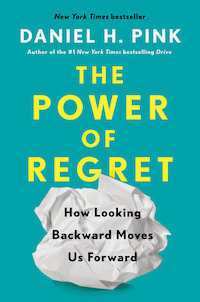How Looking Backward Moves Us Forward
The Power of Regret: How Looking Backward Moves Us Forward
By Daniel Pink
(Penguin Random House, 2022 – Learn more)
Reviewed by Cathy Gassenheimer

Creativity and motivation author Daniel Pink suggests that regrets can make us stronger. In his new book, The Power of Regret: How Looking Backward Moves Us Forward, he eschews the notion that people can have no regrets and provides stories to back up his claim.

Extensive Surveying
Pink created the American Regret Project to gather evidence for his book. The project surveyed and categorized the regrets of more than 4,000 people. Additionally, Pink launched this website which now has more than 19,000 regrets from people in 105 countries! You can become a contributor by clicking on the link and sharing one or more of your regrets.
Four Types of Regrets
Dan Pink divides the results of his research into four categories: foundational, boldness, moral, and connection.
► Foundation regrets come from a poor choice we made and on “our failures of foresight and conscientiousness” (pp. 85-86). As an example, Pink turns to Aesop’s story of the grasshopper and the ant. The grasshopper played all summer while the ant steadfastly collected and stored food for the coming winter. The result? During the winter, the grasshopper starved to death while the ant thrived.
A more recent example from one of the people surveyed read:
“I should have worked harder in college. Achieving better grades would have allowed me to get a better job, earning more, sooner in my career” (p. 92).
The lesson behind foundation regrets? “Think ahead. Do the work. Start now” (p. 96).
► Boldness regrets arise when we were perhaps too timid and failed to take advantage of an opportunity that presented itself. Pink notes that boldness regrets sound like “If only I’d taken that risk” (p. 101).
He shares this quote from a 48-year-old: “I regret not being more adventurous…taking time to travel, explore, and experience more of what the world has to offer. I let the fear of disappointment rule me and allowed others’ expectations to be more important than my own. I was always the ‘good soldier’ and worked hard to please those around me. I have a good life – I just wish I had more experiences to share with others. Someday….”
The remedy to boldness regrets: “Speak up” or to quote a well-known trademark: Just do it!
► Moral regrets: Fortunately, Pink notes that moral regrets number among the fewest recorded, representing around 10 percent of those regrets collected. Moral regrets involve violating our value systems or playing against the rules of civil behavior. Those regrets cause us to think, “If only I’d done the right thing” (p. 115).
“I regret the fact that I lost faith and strength in myself and cheated on my wife. I feel the regret every day” (p. 123).
The lesson of moral regrets? “When in doubt, do the right thing” (p. 129).
► Connection regrets: According to Pink, “connection regrets are the largest category in the deep structure of human regrets” (p. 133).
He chronicles a story of best friends who, over the years, lost touch with each other. Now the friend who completed the survey is afraid that it’s too late to reconnect: “I regret not having that relationship in my life. I’ve missed having another person in my life who could share with me the kind of growth I’ve experienced over the years” (p. 132).
The lesson here is “do better next time…do something now…push beyond the awkwardness and reach out” (p. 146). And, happily, after talking with Pink, the friends reconnected and got back in touch!
Confronting Our Regrets: If Only or At Least…
One of the most valuable parts of the books is the categorization of these four regrets with suggestions about how to overcome each one. Pink offers this chart on p. 150:
Pink suggests that reflecting on a regret provides the opportunity to act differently the next time. He suggests that using the prompts “If only…” or “At least…” can help.
“If only” helps us consider future actions and, if possible, remedy the harm done. “At least” helps us forgive ourselves and look for some silver lining in that regret. For example, when I reflect on my regret about my father, I can honestly say, “At least in the last five years of his life we connected in ways we had never done before and both he and I felt love.”
Self-Compassion Is Key
As educators, I suspect we have all regrets…about former students, colleagues, or paths not taken. Pink suggests that for all of those regrets – except perhaps the most heinous, and hopefully none of us have one of those – we should practice self-compassion. We tend to be harder on ourselves than we are on others.
Pink suggests that “rather than belittling or berating ourselves during moments of frustration or failure, we’re better off extending ourselves the same warmth and understanding we’d offer another person” (p. 174).
If you have a regret that sticks with you, reading this book might help. And even if that isn’t the case, you’ll find some ideas and stories in the book worth considering and sharing with others. Trust me, you won’t regret reading it.
Cathy Gassenheimer is a professional learning consultant specializing in collaborative adult learning and collective efficacy. For 22 years she was Executive Vice President of the Alabama Best Practices Center, a program of Alabama’s statewide business/community nonprofit A+ Education Partnership, and led the work of three statewide educator networks focused on teaching, leadership, and instructional coaching. Connect with her via LinkedIn and on Twitter @cathygassenheim.































